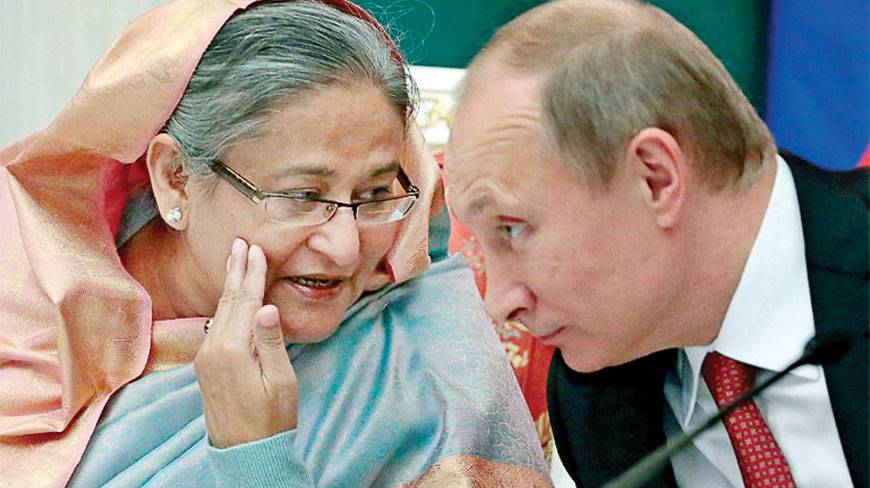It doesn’t go with the principle of positions taken by the Sheikh Hasina regime. Dhaka should have voted in favour of Moscow by opposing the UN General Assembly resolution adopted on March 27, 2014 that called Russia’s annexation of Crimea illegal.
Instead, Bangladesh preferred to abstain from a “yes” vote by the majority of UN member states (100 out of 193). The majoritarian democratic spirit is of no value to a government which doesn’t respect such principles at home.
Dhaka could have joined 11 exclusive countries that opposed the UN resolution on Crimea. On their part, it was deemed fair enough to stand by their friend Vladimir Putin, without bothering about the territorial integrity of Ukraine. Our foreign ministry has failed to learn from the Bangladesh Cricket Board how to appease a friendly country to buy its friendship.
I don’t understand why the present government missed the opportunity to become a closer ally of Putin’s Russia. During Prime Minister Sheikh Hasina’s reign, Bangladesh has already been a close friend of Russia, signing nuclear and arms procurement deals. If her advisers feel Moscow has done the right thing by taking over Crimea from Ukraine, why don’t they wholeheartedly support their friend?
Putin has made the gambit of posing a challenge to the West after certain calculations of possible implications of his aggressive actions and of the future world order. Former US Secretary of State Hillary Clinton thought that Putin wanted to redraw the boundaries of Europe. The West, led by the US, has been trying to make Russia quarantined economically.
A product of the spy agency of the Soviet empire KGB, Putin has his frustration seeing the American hegemony after the end of the Cold War and dismantling of the Union of Soviet Socialist Republic in 1991. He is looking at the East in a quest for allies, bearing in mind that the world’s centre of economic gravity is shifting to Asia.
What was Dhaka’s calculation while preferring abstention in the UN move? US Ambassador Dan W Mozena has regretted Bangladesh’s inability to join the “majority,” ventilating Washington’s disturbing feeling. This has apparently made Russians somewhat happy. Dhaka is indifferent to any reactions from the West which imposed sanctions against Putin and his friends.
So, we have given more importance to a political ally than major trading partners – the European Union and the US – where many non-resident Bangladeshis are also living. This is not a testament of the economic diplomacy Dhaka has long been talking about to maximise national interests. We are still confused about how we should define and build friendships in the international arena.
The government of Bangladesh, in the post-independent era, had proved miscalculations when it exported jute to Cuba inimical to the US interest. I still wonder if there was any diplomat or foreign policy analyst to point out that Bangladesh could no longer be entitled to American food aid under PL-480 (public law) program, as we had been closer to the Fidel Castro regime. We had a famine in 1974.
Now, Dhaka’s abstention from UN voting on the Ukraine issue proves to be contradictory. As a matter of foreign policy principle, Bangladesh is supposed to uphold the territorial integrity of any nation. Dhaka sent troops to Saudi Arabia in 1990 to join the US-led coalition to free Kuwait from Iraqi occupation, although Iraq’s president at that time, Saddam Hussain, claimed the oil-rich kingdom to be an integral part of Iraq.
One may argue that Putin annexed Crimea after a referendum which the UN resolution declared illegal. We don’t need the answer to whether Dhaka would support a referendum on the Kashmir dispute should the UN move to take such a resolution.
We can also understand that Bangladesh cannot afford to become the Switzerland of the East – we are and have to remain engaged in conflicting situations around the world. Gone are the days of quiet diplomacy and we are curious to know the line of thinking of the regime for determining the choice in such a crisis.
China and India are in the list of deliberate absentees and their decisions were taken from independent perspective of each economic powerhouse. Are our interests 100% compatible with those of our two great neighbours? We are living in a world where independent thinking is not a gift of the Magi. We did not see the US, being the closest ally of Israel, cursing Bangladesh for its support to the Palestinians.
The countries that objected to the UN resolution are considered to be long-term Russian allies and countries under its spheres of influence and mostly governed by authoritarian rulers or elected dictators. It was crystal clear why they supported Russia.
Domestically, the government in Dhaka today has even overstepped Vladimir Putin’s policy. Whereas he had to manoeuvre carefully to keep others out of power, Sheikh Hasina’s administration has left no room for the opposition in parliament. The Russian leader has at least wanted to come to some terms with the West. But the Bangladesh premier has shown much more courage in ignoring the West.
Source: Dhaka Tribune










